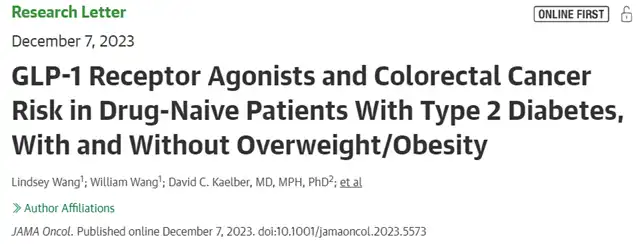Diabetes Medication May Reduce Colon Cancer Risk
- Normal Liver Cells Found to Promote Cancer Metastasis to the Liver
- Nearly 80% Complete Remission: Breakthrough in ADC Anti-Tumor Treatment
- Vaccination Against Common Diseases May Prevent Dementia!
- New Alzheimer’s Disease (AD) Diagnosis and Staging Criteria
- Breakthrough in Alzheimer’s Disease: New Nasal Spray Halts Cognitive Decline by Targeting Toxic Protein
- Can the Tap Water at the Paris Olympics be Drunk Directly?
Diabetes Medication May Reduce Colon Cancer Risk: Study with Over 1.2 Million Participants
- Should China be held legally responsible for the US’s $18 trillion COVID losses?
- CT Radiation Exposure Linked to Blood Cancer in Children and Adolescents
- FDA has mandated a top-level black box warning for all marketed CAR-T therapies
- Can people with high blood pressure eat peanuts?
- What is the difference between dopamine and dobutamine?
- How long can the patient live after heart stent surgery?
Diabetes Medication May Reduce Colon Cancer Risk: Study with Over 1.2 Million Participants
Diabetes and obesity are associated with an increased risk of various types of cancer.
Glucagon-like peptide-1 (GLP-1) receptor agonists, known for their role in controlling blood sugar, weight reduction, and immune system regulation, have been approved for the treatment of diabetes and obesity.
However, their impact on the risk of cancer in individuals with diabetes or obesity remains unclear.
A recent study published in JAMA Oncology suggests that GLP-1 receptor agonists may reduce the risk of colorectal cancer, with a more significant correlation observed in individuals with type 2 diabetes and overweight/obesity.
The paper emphasizes that the potential preventive effect of GLP-1 receptor agonists on colorectal cancer may be mediated by weight loss or other mechanisms unrelated to weight loss.

Due to overweight/obesity being a major risk factor for colorectal cancer, researchers hypothesized that GLP-1 receptor agonists may be associated with a reduced risk of colorectal cancer in type 2 diabetes patients compared to non-GLP-1 receptor agonists.
The nationwide retrospective cohort study evaluated the impact of different types of antidiabetic drugs on the risk of colorectal cancer in type 2 diabetes patients with or without overweight/obesity.
The studied antidiabetic drugs included GLP-1 receptor agonists and seven non-GLP-1 receptor agonists, such as insulin, metformin, alpha-glucosidase inhibitors, dipeptidyl peptidase-4 (DPP-4) inhibitors, sodium-glucose co-transporter-2 (SGLT2) inhibitors, sulfonylureas, and thiazolidinediones.
The study included 1.22 million type 2 diabetes patients diagnosed between 2005 and 2019 who received the mentioned antidiabetic drugs. Fifteen years of follow-up analysis revealed:
-
GLP-1 receptor agonists were significantly associated with a reduced risk of colorectal cancer compared to insulin (HR=0.56), metformin (HR=0.75), SGLT2 inhibitors, sulfonylureas, and thiazolidinediones.
-
Compared to alpha-glucosidase inhibitors and DPP-4 inhibitors, GLP-1 receptor agonists showed a lower, albeit statistically insignificant, association with the risk of colorectal cancer.
Gender-specific analyses for female and male type 2 diabetes patients yielded consistent results.
Notably, the analysis indicated that, compared to insulin (HR=0.50), metformin (HR=0.58), or other antidiabetic drugs, GLP-1 receptor agonists were significantly associated with a reduced risk of colorectal cancer in type 2 diabetes patients with overweight/obesity, and this correlation was more pronounced.
In conclusion, this cohort study suggests a correlation between GLP-1 receptor agonists and a reduced risk of colorectal cancer in type 2 diabetes patients, with or without overweight/obesity.
The researchers emphasize the need for further clinical trials to determine whether these drugs could be used for the prevention of other types of cancer in the future.
Diabetes Medication May Reduce Colon Cancer Risk: Study with Over 1.2 Million Participants
(source:internet, reference only)
Disclaimer of medicaltrend.org
Important Note: The information provided is for informational purposes only and should not be considered as medical advice.



